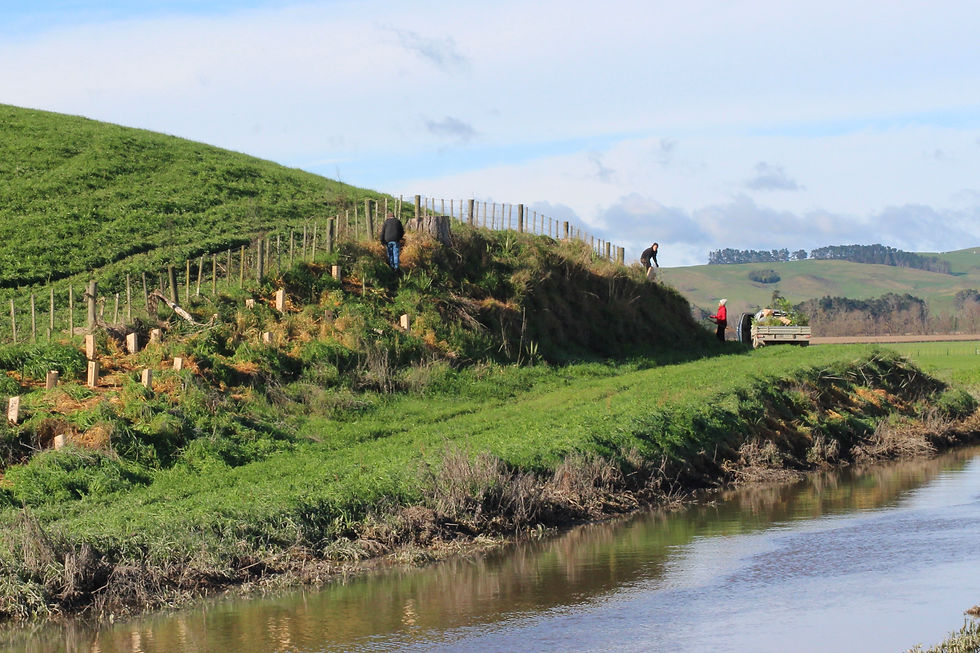Miles and Megan McBain farm Kahotea Farm, a 300ha Te Aute cropping and livestock finishing property. Miles is the 5th generation on the farm which has been in his family since 1884. In 2014, Miles took over the farm from his father, Hugh McBain, who had planted over 125 species of trees on Kahotea and was winner of the 2014 Hawke’s Bay Farm Forester of the Year.
Miles inherited his father’s passion for planting and, along with wife Megan, a landscape architect, has planted thousands of natives on the farm in recent years. Much of the planting has been riparian planting, which as well as providing aesthetic benefits, improves water quality and biodiversity.
Kahotea was hit hard by Cyclone Gabrielle and when the Waipawa River burst its banks, water rushed onto the farm. “The driveway was like Huka Falls, just pouring”, says Miles. “Every day we walked down the hill from the house and looked at the water level and thought, this can’t get any worse and every day it did until the water was just meters from the end of the driveway”.
The flooding turned much of the farm into a huge lake which was estimated to be about 950ha across three farms and was three meters deep in places. At the height of the flooding, the Kahotea hay barn was about one metre from going under water. “I got in a single scull boat at the end of Drumpeel Road and rowed around the top of my hay barn, touched the roof, and rowed back again”, says Miles.
Miles and Megan feel grateful that their house and stock were unaffected. “We were lucky to get our peas, export squash and grass seed harvested pre cyclone”, says Miles. They did however lose crops, including 30ha of wheat lost two weeks out from harvest, 25ha of chicory and 15ha of brassica.
Years worth of riparian planting along the main farm drain and tributary were also lost, including 2000 natives planted just last year. “The flood decimated the lot, even carexes that normally withstand the water and spring back just couldn’t cope with the silt”, says Miles. “It was probably one of the most heartbreaking things about the cyclone for us. Planting is a lot of work and watching it become established had been incredibly satisfying”.
The replanting has now begun, and today they are planting flaxes, grasses, cabbage trees, pittosporum and ake ake along the main farm drain. Family members have come to help them plant, including Megan’s parents who were also here this time last year, planting natives which did not survive the force of the flooding.
Miles and Megan have applied for a grant from Hawke’s Bay Regional Council to cover some of the replanting costs, but are yet to hear back. “We have spent a lot of our own money replanting because we just want to keep going”, says Miles.
Today as they plant, they are finding carrots, beans and radishes growing along the side of the drain. “All our seed and seed from our neighbours upstream was spread across the whole flooded area”, says Miles. “We are going to end up with all sorts of vegetables growing all over the flats and amongst our riparian planting”.
During the cyclone, Miles and Megan had to watch as pallet loads of their newly purchased recycled plastic posts floated away. They were able to recover most of them and have now repaired 1km of boundary fencing with them. “I just love the idea of how much plastic they are saving from going to the landfill”, says Miles. “We have a lot of trouble with timber posts on the flats; they just rot. I can only presume that these plastic posts are not going to melt down in the sun, they are not going to break and they are not going to deteriorate”.
Like many Hawke’s Bay farmers, the McBains are slowly starting to repair the damage caused by Cyclone Gabrielle and reestablish years of work undone as a result of the extreme weather event. “I don’t want to just sit on my hands”, says Miles. “Although in the back of our minds we know this could happen again, we just have to move on and have another crack at it”.
Miles and Megan are active members of the Papanui Catchment Committee which is working to identify and address environmental land and water concerns within the catchment. The committee recently submitted an application for a Tukituki Land Care Demonstration Grant which they hope to use on a project which will involve local school children and help foster a sense of community engagement. “It has been great to make use of the administrative support and advice from Tukituki Land Care”, says Megan. “we feel like we are making progress and look forward to seeing what we can achieve collectively”.











Comentarios